
“The situation in Estonia and Latvia is completely different. We made the choice in the very beginning and became citizens of Lithuania and our whole situation started then. We are trying to ensure our rights through legal ways, we undoubtedly have problems in the education system and social life, but to say that we are different from the rest of the citizens – the Constitution does not state that we have to be mistreated. Our situation is really different and we cannot generalize,” Dmitrijeva told journalists at parliament on Tuesday.
After restoring its independence, Lithuania granted citizenship to all residents in the country, therefore, there are no non-citizen Russian-speakers in Lithuania, contrary to Latvia and Estonia where Russian-speakers must go trough the naturalization process.
Asked whether, in her opinion, the rights of Russian-speakers are violated in Lithuania, Dmitrijeva said “poverty does not have nationality”.
“I believe poverty, unemployment do not have nationality, and we all must fight them. Both Russians and Lithuanians are emigrating, this is the real problem that needs our attention, and those problems are the same for everyone,” Dmitrijeva said.
Meanwhile Artūras Paulauskas, chairman of the Lithuanian parliamentary Committee on National Security and Defence, said that such statements by Russian officials need a joint response of the Baltic states.
“That statement [that the Baltic states violate the rights of Russian-speakers] was made by a representative of the Russian Ministry of Foreign Affairs who is responsible for the implementation of human rights, democratic freedoms, and that statement is not only his personal opinion. That sentence that we won’t stop and tolerate this, we can obviously see it as a threat. I think it always starts with a word, and these words are being repeated and repeated. It’s not the first time, and then the words evolve into actions,” Paulauskas told journalists.
Russia previously accused the government of Ukraine of violating Russian-speakers’ rights.

Be the first to comment